India
Recovering in Rishikesh
Today was pretty much a null and void day, as I was still recovering from my adventure and ordeal into the Himalayas. The thought of even going near a mechanized vehicle would make me sick.
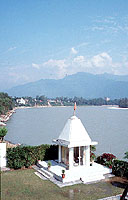 The morning started off very enjoyably,
being able to meditate in the morning.
And when I got to breakfast on the porch
of the hotel Ganga Kinare, overlooking
the Ganges, there was the whole gang of
my fellow New Yawkers. Like all good
new Yawkers, they still were bitching and
moaning about the conditions of the hotel.
By this time, I've really come to enjoy
this hotel - I mean it's not 5 stars,
but the service is excellent here, and
it is such a quiet oacis, right next
to the Ganges river. I spent a lot of
my time writing these journal entries on
the back porch with its terrific view.
The morning started off very enjoyably,
being able to meditate in the morning.
And when I got to breakfast on the porch
of the hotel Ganga Kinare, overlooking
the Ganges, there was the whole gang of
my fellow New Yawkers. Like all good
new Yawkers, they still were bitching and
moaning about the conditions of the hotel.
By this time, I've really come to enjoy
this hotel - I mean it's not 5 stars,
but the service is excellent here, and
it is such a quiet oacis, right next
to the Ganges river. I spent a lot of
my time writing these journal entries on
the back porch with its terrific view.
But my fellow home boys and girls have been staying in 5 star hotels for the whole trip and the drop in quality for them was a bit too severe. But we spent an hour conversing about spirituality (they are practicing Hindus), travelling through India, etc. Apparently, according to them, South India is much more together and cleaner, which sounds fine to me.
An old friend told me that the state of Uttar Pradesh is a MESS, and I can verify it. Remember, there are 60 million people in this state alone, which is more than most, if not all European countries. Finally, the poor folks, who are older than me, went and found another hotel. They left in a huff, but we made a nice connection.
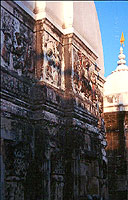 You know, it's a matter of personal preference
how much you really want to touch India
(or any country you are visiting, but India
in particular). You can stay in 5 star hotels
and go on scheduled bus tours and miss the
whole point, the heart and soul. It's in
the people, and you have to mingle and get
out there on the streets. Of course, you
can go overboard, and sleep on the streets
with the beggars and cows, but that's getting
a bit too close for me.
You know, it's a matter of personal preference
how much you really want to touch India
(or any country you are visiting, but India
in particular). You can stay in 5 star hotels
and go on scheduled bus tours and miss the
whole point, the heart and soul. It's in
the people, and you have to mingle and get
out there on the streets. Of course, you
can go overboard, and sleep on the streets
with the beggars and cows, but that's getting
a bit too close for me.
But before I left for this trip, a friend at work lent me a copy of Bhagavan Dass's autobiography, It's Here Now, Are You?. Bhagavan Dass, if you don't recall is the American sadhu that Ram Dass meets and leads to Neem Karoli Baba, as described in his landmark book Be Here Now. It is very interesting to hear Ram Dass's adventures from Bhagavan Dass's point of view. For example, when Ram Dass first meets Neem Karoli Baba, he sees Bhagavan Dass crying, thinking it's some strong act of devotion. But Bhagavan Dass describes it as a weight of guilt for not previously taking Neem Karoli Baba's instruction, and going off into a Buddhist scene.
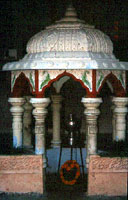 Bhagavan Dass really got down to it, and it
makes you wonder about the potential of
the pull of a previous life. It is something
that I was also talking about with a friend -
would something pull me here so strongly that
I end up throwing my bags in the Ganges, and
head up to some hill, throwing rocks at
passersby. Well, I don't think that's gonna
happen, but it do feel comfortable here with
certain portions of Indian culture, mostly
it's spirituality. Of course, the culture
here is very much intertwined with its
spiritual history, much more so than in
the west.
Bhagavan Dass really got down to it, and it
makes you wonder about the potential of
the pull of a previous life. It is something
that I was also talking about with a friend -
would something pull me here so strongly that
I end up throwing my bags in the Ganges, and
head up to some hill, throwing rocks at
passersby. Well, I don't think that's gonna
happen, but it do feel comfortable here with
certain portions of Indian culture, mostly
it's spirituality. Of course, the culture
here is very much intertwined with its
spiritual history, much more so than in
the west.
On the other hand, I often feel like I'm in such a bizarrely different place, being immersed in a psyche that is totally foreign. However it does penetrate quickly - I find myself naturally doing "Achcha" (Hindi for yes, affirmative or good), and learning how to interact with Indian more effectively. A lot of that is being very affirmative in my stance, since they can be a bit bossy at times - when some Indians can't handle a situation, they have a unique way of doing a control number, and you have meet this head on. I remember Dennis Quaid on the Letterman Show a few months ago, describing his experience in India. He summed it up as "like being on Mars". He and his wife, Meg Ryan, have been on the spiritual circuit, sitting with Adi Da and Poonjaji just before he passed away.
And because this place is so different culturally, physically, psychically and economically from the west, whenever I go to a town, I am first disoriented, off balance, feeling a bit small - there's little familiar to hook into, which is something that comes effortlessly when you go to a different city in your own country - it's a little different, there is some contrast, but you know the score, you can talk and ask questions if you're lost or do not know some procedure. This is not the way it is here - it's like starting all over again. Personally speaking, I usually study a map to get a physcial orientation, and then set up familiar points - a chai shop, a restaurant or bank that begins to form a network of the familiar to help ground me, giving me a platform to stretch out.
Anyway, I now 'grok' Rishikesh, and feel comfortable getting around. But I am not happy about the noise, the smoke, the intensity of the town - it begins to grate on my nerves, I am getting a bit jumpy. Additionally, Indians have a smaller sense of personal space than those of us in the US, and this translates to running vehicles - cars, motorcycles and bicycles will pass me by so close that I sometimes jump, and that takes some getting used to.
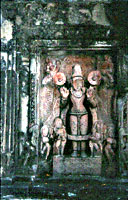 I spent the afternoon wandering the
Trevini Ghat area, which is partially
off limits to vehicles, and went
to the Bharat Mandir, a Vishnu temple
that is the oldest temple in Rishikesh,
established in the eight century. This
temple was also established by the
sage Shankara - man that guy got around!
He was, if you don't know, responsible
for setting up the swami order structure
that is still in use today.
I spent the afternoon wandering the
Trevini Ghat area, which is partially
off limits to vehicles, and went
to the Bharat Mandir, a Vishnu temple
that is the oldest temple in Rishikesh,
established in the eight century. This
temple was also established by the
sage Shankara - man that guy got around!
He was, if you don't know, responsible
for setting up the swami order structure
that is still in use today.
When I go to a temple, I like to sit for a while if possible, for one, to honor it and two, to help feel into the presence of the force there. The local Hindu population, on the other hand, seems to be fine simply to stay for a few moments, give some dakshina (offering most often in the form of money), and move on. Perhaps it's all exoteric, cultural norms, but here there's room for both the the folks who do the 2 minute tour of the temple, and the swami, sadhu, priest or pujarist who keeps the place alive esoterically. Though I've been choosing where to go, I have felt a real blessing, a real aliveness in every one of them. These are India's treasures and oases from the chaos of ordinary life, and a lot of work over many centuries have gone into keeping the flame alive.
 Going from temple to temple, and experiencing
various levels of spirit force and aliveness
in these places, I cannot help but think
about my own childhood religion, Catholicism,
and how dead it was for me. Now I know
that there are some churches out there
in the world who have a potency, but
the real deep esoteric systems and energies
have been lost, and being here, I really
feel a loss regarding that. Because
something that I heard once in a dreamwork
course always has left me a bit of an
ouch - it was a remark made by Carl Jung,
which was, "abandoning the religion of
your birth for eastern religions is a form
of self-hatred". Now this doesn't means
old Carl is accurate and doesn't take
into consideratioon the issue of "past lives"
- but a statement like
that does give pause for contemplation
(at least it did for me), and this was
discussed on the Ken Wilber listserver
group earlier this year.
Going from temple to temple, and experiencing
various levels of spirit force and aliveness
in these places, I cannot help but think
about my own childhood religion, Catholicism,
and how dead it was for me. Now I know
that there are some churches out there
in the world who have a potency, but
the real deep esoteric systems and energies
have been lost, and being here, I really
feel a loss regarding that. Because
something that I heard once in a dreamwork
course always has left me a bit of an
ouch - it was a remark made by Carl Jung,
which was, "abandoning the religion of
your birth for eastern religions is a form
of self-hatred". Now this doesn't means
old Carl is accurate and doesn't take
into consideratioon the issue of "past lives"
- but a statement like
that does give pause for contemplation
(at least it did for me), and this was
discussed on the Ken Wilber listserver
group earlier this year.
In that I have to get back to Delhi in order to fly to Varanasi, my next destination, it was my first attempt to purchase a railway ticket on the Shatabdi express, to get back to Delhi from up north. So I hop into an auto-rickshaw, and even though I pre-negotiate, I still know I'm getting ripped of. But to put it in perspective, it's the difference between 10 and 25 US cents. You can nickled and dimed into poverty here in India. Anyway, I get to the train station, and the booking office is closed, and most of the signs are in Devanagari. I finally find one man who speaks broken English who tells me that the office re-opens at 6PM.
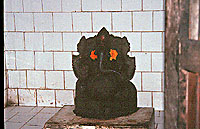 So I go to may favorite haunt, Neelam's
restaurant and ask my patron saint, Mr.
Singh if the train station booking office
really opens up at 6. He asks me where
I am going and tells me that he'll just
call his guy and make the arrangements.
Done deal, come by later and pick up
the ticket. It's good to have a patron
saint. He asks me for 100 rupees for
a down payment (435 rupees total for
a 3 hour train ride, 10 bucks, a good
deal), and says, "do you know why I
am asking for 100 rupees? So you will
show up tomorrow with the rest of the
money." I can see Mr. Singh has had
much experience dealing with spiritual
airheads from the west.
So I go to may favorite haunt, Neelam's
restaurant and ask my patron saint, Mr.
Singh if the train station booking office
really opens up at 6. He asks me where
I am going and tells me that he'll just
call his guy and make the arrangements.
Done deal, come by later and pick up
the ticket. It's good to have a patron
saint. He asks me for 100 rupees for
a down payment (435 rupees total for
a 3 hour train ride, 10 bucks, a good
deal), and says, "do you know why I
am asking for 100 rupees? So you will
show up tomorrow with the rest of the
money." I can see Mr. Singh has had
much experience dealing with spiritual
airheads from the west.
So I make plans for my next leg, to go to Mussourie, since I have 3 days before I have to go to Delhi. Mussourie is known as a "hill station", a high mountain town that was constructed for the exclusive purpose of keeping the homesick British cool and out of the oppressive heat of the Indian summer. Mussourie sits on top of a mountain 6000 feet up, offering good views of the Himalayas. So I figure I go see what a hill station is all about and fill in the time.
But before I leave I go back to the Triveni Ghat to attend Gangarati. Having had such a revelation the first time, I wanted to see if it was a one time event or not. This time, though there was no surprise element, it was equally as powerful. That particular point, Triveni Ghat is right where the Ganges is bending 90 degrees and that may be a reason why it is such a power spot. In any case, if you do go to Rishikesh, do go to Gangarati and experience the power of the big lady Gangaji yourself.
I taped the arati song and while walking away I went home a different route. Apparently it was a route where a lot of beggars and crippled sadhus take, as I saw one man, bent over in practically in half, and another man with a right leg so warped that only the ball of his foot touches the ground. Each step seemed like agony to him. Sometimes it gets to you, I was holding back the tears.
 Back |
 Next, Mussourie |
|
|
Page 12. |
||
